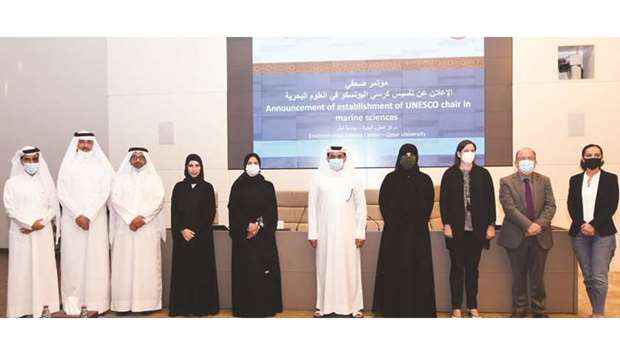Qatar University (QU) and United Nations Educational, Scientific and Cultural Organisation (Unesco) announced the establishment of the Unesco Chair in marine sciences at the Environmental Science Center, Qatar University.
The chair in marine science is the first of its type in the region.
The Science Plan covers the following natural and anthropogenic components related to Arabian Gulf:
Arabian Gulf circulation, climate change, sea level rise, Shamal winds and swells, geomorphological changes due to coastal and offshore developments, marine pollution and its management, hypoxia formation & ocean acidification and anthropogenic impacts on the Gulf’s ecosystems.
During the announcement ceremony for the Unesco Chair, QU President Dr Hassan bin Rashid al-Derham said that this chair is evidence of the position that QU enjoys in the scientific research sector related to the fields of the marine environment, adding that QU is a pioneer in this research and has a high research infrastructure, such as the Sea Lab, Janan Research Ship, and distinguished Qatari scientists involved in these important fields.
He pointed out that the QU has strengthened its local partnerships with various parties concerned with the marine environment, and has completed many research projects to transfer this partnership to an international level with Unesco, which enhances the level and diversity of these projects. He stressed on the university’s endeavour to expand its partnerships with regional and international organisations in various fields.
Vice-President of Research and Graduate Studies, Professor Mariam al-Ali al-Maadeed said the establishment of a Unesco chair at the Environmental Science Center is a clear indication that it has becomes an important research institute in marine sciences in terms of scholars and assets.
It is a reward for the excellent and persistent work being carried out in the centre and the steady progress achieved so far.
QU is known for its continuous initiatives to achieve the SDGs 2030 and support society.
Dr Anna Paolini, director of Unesco Office in Doha and Unesco representative in the Arab States of the Gulf and Yemen stated that “promoting international scientific co-operation on critical challenges to sustainable development such as climate change, ocean science and protection of marine ecosystems are some of our key missions in Unesco.
“I am glad to see that Qatar University has taken the initiative to foster the scientific collaboration among the universities, private sectors as well research centres in the region through the establishment of this important Unesco chair in the field of marine science.
“I’m confident that the chair will not only generate knowledge and expertise but will also help provide local solutions and innovations towards achieving the targets of the SDG 14 — conserve and sustainably use the oceans, seas and marine resources.”
Secretary General of the Qatar National Commission for Education, Culture and Science Dr Hamda Hassan al-Sulaiti said that “The establishment of the Unesco chair with collaboration between Unesco, Qatar University and colleges and higher education institutions in Qatar came up because of the joint efforts and co-operation between the Qatar National Commission for Education, Culture and Science, Qatar University and Unesco Office in Doha.
“The aim is to benefit from the potentials of the international organisation in support and enforcing the national capabilities, in addition to preparing the Qatari cadres to handle and manage the development projects in the upcoming phase.
“Those efforts resulted in the signing of a number of agreements of Unesco chairs with higher educational institutions, including the Unesco chair in education and technical and practical training with College of North Atlantic and Qatar Petrochemical Company (Qapco), the Unesco chair in marine sciences with Qatar University.”
For his part, the Director of the Environmental Science Center, Professor Hamad al-Saad al-Kuwari said the marine environment is vital importance to the cultural heritage, economy, and sustenance of Qatar as well as other Gulf countries.
Through this Unesco Chair, studies will be carried out to cover the marine and coastal environs of the Gulf with particular reference to the exclusive economic zone (EEZ) of Qatar in line with SDGs of the 2030 and the Roadmap for the UN Decade of Ocean Science, he said.
He added that the objectives of the chair will also contribute to the economic growth, social development and environmental management of the Qatar National Vision 2030 as well as the energy and environment pillar of Qatar National Research Strategy and QU National Research Priorities.

..
